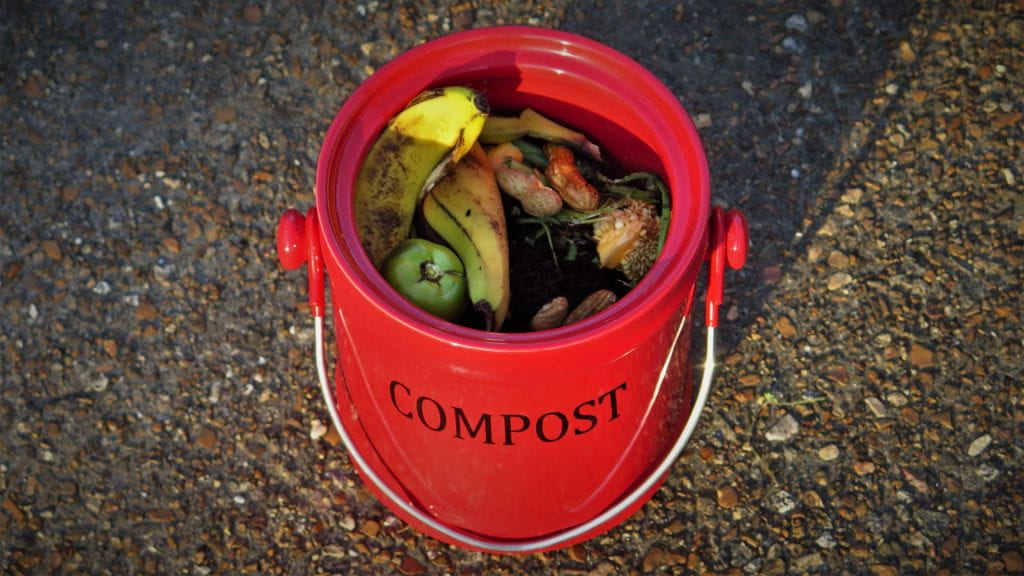Increasing access to composting has been an ongoing effort at WashU. Responding to a popular student demand, composting came to the DUC in September 2019, at the same time as the pilot program for residential composting on the South 40 became a permanent service. While these programs offer a robust composting infrastructure on campus, a new need emerged after a significant portion of WashU students moved to off-campus in the wake of the COVID-19 housing shakeup. Now living and cooking on their own, students who relied on dining halls or residential composting are once again seeking alternatives to sacrificing their food scraps to the landfill.
Debunking Yard Waste Composting
As you may have noticed walking around St. Louis alleys, green yard waste bins usually sit next to the trash and recycling bins. Though these green bins may look like a welcoming home to your kitchen scraps, they are only intended for small branches, grass clippings, leaves, brush, and plants – not the leftovers from your apartment’s pizza night. Yard waste is collected by St. Louis Composting Inc. who ultimately turns it into mulch; a process distinct from composting that is disrupted when large amounts of food scraps are added to the mix.
Students Offer Easy & Free Alternatives
With the yard waste bins discounted as a compost receptacle, an alternative is needed to save precious organic waste from being needlessly lost to the trash. While some local organizations offer convenient compost pick up services, it comes with a cost that often acts as a barrier for students.
Thankfully, a coalition of student groups, including the Burning Kumquat, WashU Green Ambassadors, and the Student Sustainability Board, collaborated to provide free composting options and resources to off-campus residents. Maya Tsingos, co-president of the Burning Kumquat, said that “When we came back to campus in COVID times, a lot of people in the sustainability space wanted to get more off-campus students involved in composting, even people who were living outside of St. Louis.”
The program deploys a number of compost options to accommodate variations of user needs. From bringing food waste to campus, to making your own backyard compost, these resources offer a solution for every situation.
1. Do-It-Yourself Home Composting
Composting does much more than diverting waste from landfills: it creates rich and nutritious soil, a critical step to return nitrogen and other essential nutrients to the Earth. For those who want to keep the fruit of their labor, do-it-yourself composting is an easy and rewarding process. For students whose homes have gardens, or maybe a jungle of houseplants, this option can cut down on gardening costs while reducing the household’s overall waste.
For those in that situation, students have created materials to help you understand how it works and how to properly balance the various components of compost. Alternative methods of do-it-yourself composting include Bokashi Composting and Vermicomposting.
2. Community Engaged Composting
If you are interested in sharing your compost with your community, the program offers resources to help identify and connect with community gardens who may benefit from your food scraps. Most cities have documented networks of community gardens, such as Gateway Greening in the St. Louis area.
“Don’t be intimidated by learning more,” Tsingos says, “even if you do not start your own compost, you can still take this as a good opportunity to learn about its uses in the community and even just more about the community itself.”
3. On-Campus Compost Collection – Pilot program!
The third option makes it easier for people who don’t want to deal with the composting process. People who enroll in that program will be able to request their own compost bucket (reused from local grocery stores) and will be given access to an on-campus tote where they can dispose of their compostables. The tote will be emptied weekly by St. Louis Composting who also collects compost from other campus operations.
With funding from Student Union, the program is set to launch in mid-November and run until December, when it will be reviewed and potentially restarted in the spring semester. The success of the program will be assessed on participation and levels of contamination – the cleaner the compost, the most likely the program will continue in the spring!
Looking Forward
“We really want composting to become normalized,” Tsingos laughs, “In my dream world, all WashU students have a compost bin. It may seem like a really small thing to do, but if everyone at WashU had a compost bucket, it would make a huge impact on cutting down on our greenhouse gases.”
Though the program is centered around composting, it also highlights the importance of student activism in making change on and around the WashU campus. Tsingos noted that, “It is really nice to see people taking on such a large role with everyone individually carrying their own part. The year’s first-year class is also extremely engaged and I met a lot of them who really helped out.”
This article was written by Natalie Snyder, Communication Associate at the Office of Sustainability.
